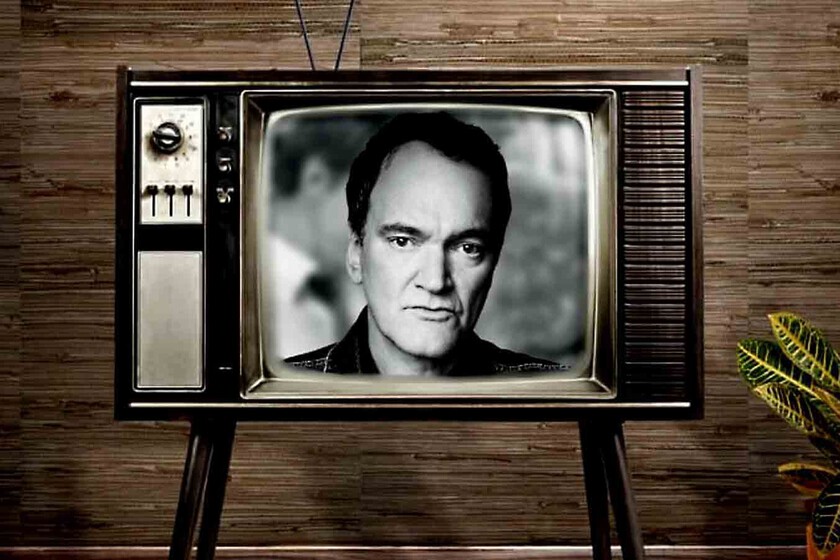Quentin Tarantino recently made an appearance on ‘The Joe Rogan Experience’ alongside his ‘Pulp Fiction’ co-writer and ‘Video Archives Podcast’ co-host Roger Avary. During the podcast, Tarantino shared his thoughts on the popular series ‘Yellowstone’. While initially entertained by the show, he felt that its dramatic structure lacked a satisfying climax.
Once Upon a Time on TV
The renowned director delved into the realm of television and its evolution, comparing it to the cinematic experience. Tarantino pondered the distinction between television and a well-crafted film, noting how series nowadays adopt a cinematic language to engage viewers.
He expressed his views on the proliferation of series, suggesting that they tend to generate a continuous stream of stories that could seemingly go on indefinitely. Despite the allure of these series, Tarantino highlighted a key difference—he believed that movies have a lasting impact that most series fail to achieve, no matter how visually appealing they may be.
Tarantino drew a parallel between his experience watching ‘Yellowstone’ and the profound impact of watching a memorable film. He emphasized that while a good Western film stays etched in one’s memory, series like ‘Yellowstone’ tend to fade away once they conclude, lacking the lasting impression that films can deliver.
Diving into the Review
In a quick recap of the series, ‘Yellowstone’ follows the Dutton family, led by John Dutton (portrayed by the exceptional Kevin Costner), as they navigate the challenges of maintaining their ranch amidst encroaching land developers and political intrigue. The show weaves a complex narrative of family dynamics, power struggles, and moral dilemmas set against the backdrop of the picturesque Yellowstone National Park.
Tarantino’s analysis of ‘Yellowstone’ sheds light on the series’ strengths and weaknesses. While praising Costner’s performance and the initial engagement of the storyline, he ultimately found the show lacking in delivering a truly satisfying resolution. The series, in his eyes, fell short of achieving the emotional crescendo that a well-crafted film can evoke, leaving viewers with a sense of disconnected drama rather than a resonant cinematic experience.
Conclusion
In conclusion, Tarantino’s insights into ‘Yellowstone’ offer a fresh perspective on the evolving landscape of television and the enduring impact of cinematic storytelling. While series like ‘Yellowstone’ may captivate audiences with their intricate plots and compelling characters, they often struggle to leave a lasting impression akin to the resonance of a memorable film.
Frequently Asked Questions
- Is ‘Yellowstone’ worth watching according to Tarantino’s review?
- According to Tarantino, while ‘Yellowstone’ has its merits, it falls short of delivering a cinematic experience that resonates long after viewing.
- What sets apart a memorable film from a series like ‘Yellowstone’?
- Tarantino believes that films have a unique ability to create lasting emotional connections and memorable moments that series often lack.
- How does Kevin Costner’s performance in ‘Yellowstone’ fare in Tarantino’s review?
- Tarantino praises Costner’s portrayal, describing it as "jodidamente maravilloso" (bloody marvelous) and a standout aspect of the series.
- What is the central theme of ‘Yellowstone’ as per Tarantino’s analysis?
- Tarantino highlights the family dynamics, power struggles, and moral dilemmas at the core of ‘Yellowstone’, set against the backdrop of the majestic Yellowstone National Park.
- How does Tarantino compare the impact of a good Western film to watching ‘Yellowstone’?
- Tarantino emphasizes the lasting emotional resonance of a good Western film, contrasting it with the fleeting nature of series like ‘Yellowstone’ that tend to fade from memory.
- What does Tarantino find lacking in the dramatic structure of ‘Yellowstone’?
- Tarantino feels that ‘Yellowstone’ fails to build up to a satisfying climax, leaving viewers with a sense of unresolved drama rather than a poignant conclusion.
- How does Tarantino view the evolution of television in comparison to cinema?
- Tarantino acknowledges the cinematic qualities of modern television but maintains that films offer a unique and lasting impact that sets them apart from series.
- What draws Tarantino to ‘Yellowstone’ initially according to his commentary?
- Tarantino was initially drawn to ‘Yellowstone’ due to his admiration for Kevin Costner’s performance and the engaging storyline presented in the first season.
- How does Tarantino describe the storytelling in ‘Yellowstone’ compared to a good movie?
- Tarantino characterizes the storytelling in ‘Yellowstone’ as interconnected drama without a definitive emotional climax, contrasting it with the storytelling in compelling films.
- What broader implications does Tarantino’s review of ‘Yellowstone’ suggest for the future of television and cinema?
- Tarantino’s review prompts reflection on the evolving landscape of storytelling mediums, highlighting the enduring impact of cinematic narratives and the challenges series face in delivering a comparable experience.
Tags: Yellowstone, Quentin Tarantino, Kevin Costner, TV series, cinematic storytelling, drama, family dynamics, memorable films.
- Tarantino’s review prompts reflection on the evolving landscape of storytelling mediums, highlighting the enduring impact of cinematic narratives and the challenges series face in delivering a comparable experience.

